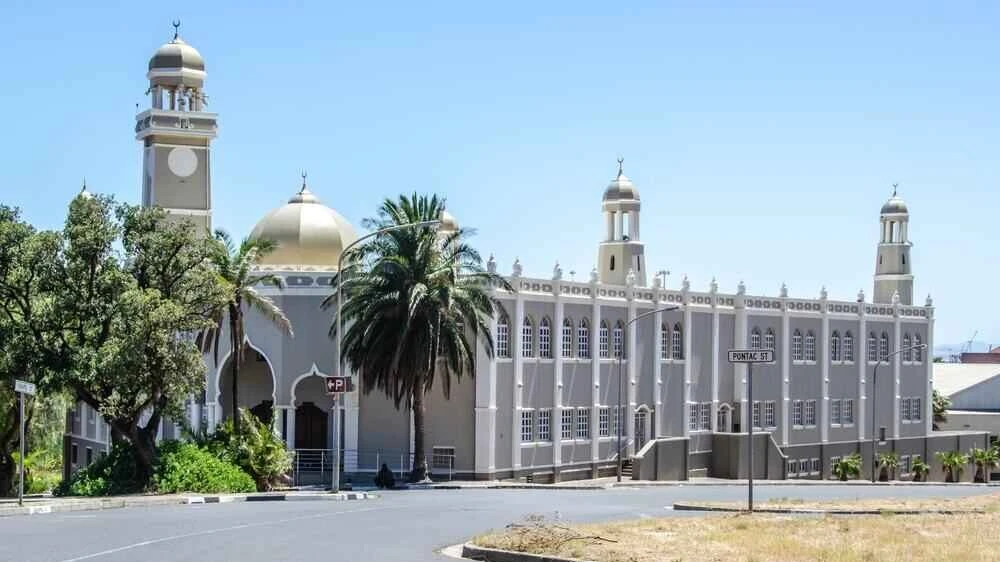Cape Town is a city known for its architectural marvels, heritage and incredible landmarks, and if you are a Muslim traveller looking to explore this beautiful city you are in the right place. The mosques of Cape Town are symbolic of the city’s history and religious pluralism. From the Auwal Masjid to the Palm Tree Mosque, these places of worship stand as revered structures that narrate tales of faith, heritage, and community. We’ll explore a brief history of Islam in Cape Town the 2 oldest mosques in Cape Town, prayer times and highlight the large selection of mosques in the mother city. Let’s Go!
Table of Contents
History of Islam in Cape Town ☪️

The roots of Islam in Cape Town trace back centuries and are etched into the city’s history. Islam’s arrival in the Cape can be attributed to the early explorations and trade ventures along the African coast. The influx of Muslim settlers, primarily from the Indian subcontinent, Southeast Asia, and other parts of Africa, infused the region with Islamic customs, traditions, and faith. The Islamic community played an instrumental role in shaping Cape Town’s cultural landscape, contributing to its language, halaal food, and social fabric and becoming the most practised belief in South Africa. Their presence and influence are evident in the vibrant Bo-Kaap neighbourhood, where the streets adorned with colourful houses and quite a few mosques offer a glimpse into the community’s heritage and legacy.
Fully Immerse Yourself In The Bo-Kaap Neighbourhood By Going On A Walking Tour And Cooking Class 🍛
Auwal Masjid 🕌


The Auwal Masjid, built in 1794 on Dorp Street in Cape Town, holds the distinction of being South Africa’s inaugural mosque, steeped in historical significance. Imam Abdullah Kadi Abdus Salaam, commonly known as Tuan, assumed the role of the first Imam at Auwal Masjid, profoundly shaping the religious and social fabric of Cape Muslims from 1804 to 1850. This mosque embodies the enduring struggle of Cape Muslims for the acknowledgement of Islam and the fundamental right to practice their faith freely. It stands on land originally owned by Coridon van Ceylon, a liberated slave, further emphasizing its symbolic significance in the fight for religious recognition.
Tuan, upon his release from Robben Island in 1793, initiated the first madrasah and conducted congregational prayers outdoors after authorities rejected the initial masjid site application. Coridon of Ceylon, having acquired properties in 1794, laid the groundwork for the mosque’s construction, expanded in 1807, with the addition of a mihrab to indicate the qiblah direction. With General Craig’s authorization, the Auwal Masjid emerged, enabling the first public Muslim prayers in the Cape Colony. It swiftly evolved into a hub for Muslim communal activities and religious regulation, marking a transformative period in the Cape’s religious landscape.
Before the mosque’s construction, stringent prohibitions limited masjid development and worship freedoms, allowing only the Dutch Reformed Church. Subsequent renovations in 1936 signified a pivotal shift, affirming the mosque’s pivotal role in championing religious inclusivity and diversity in Cape Town. The Auwal Masjid’s significance transcends its age; it symbolizes the steadfastness and determination of the early Muslim community in upholding their faith in a new land. Stepping inside, one is enveloped by a sense of community, with the echoes of prayers and the fragrance of incense lingering in the air.
Address: 43 Dorp St, Cape Town City Centre, Cape Town, 8001
Website: https://www.auwalmasjid.co.za/
Contact Number: 082 551 7324
Palm Tree Mosque 🏝️


The Palm Tree Mosque, also recognized as the Church of Jan van Bougies or Dadelboom Mosque, stands as a cornerstone along Long Street, Cape Town, South Africa. Its roots delve into the 18th century, earning the distinction of being one of the oldest substantially unaltered buildings lining this historic street. Originally belonging to Hermanus Smuts, the property exchanged hands before finding its way into the possession of Jan van Bougies and Frans van Bengalen in 1807. By 1811, Jan van Bougies became the sole proprietor, transforming the erstwhile residence into a mosque, possibly between 1811 and 1821, integrating changes such as the addition of a second storey.
Jan van Bougies’ foresight ensured the mosque’s longevity as he specified in his will that the property should persist as a mosque posthumously, a testament to his dedication to religious diversity and tolerance. Amidst structural alterations due to Long Street’s elevation over time, with subsequent adaptations to windows and doors, the mosque retains its historical charm. Its historical lineage, spanning from the late 18th century to the early 19th century, cements its status as a treasured relic of Cape Town’s past.
The presence of a lone surviving palm tree, standing tall amidst the changes, serves as a poignant reminder of the mosque’s earlier garden landscape. This iconic structure embodies the region’s history and stands as an emblem of Cape Town’s cherished heritage, inviting visitors to delve into its rich narrative and architectural legacy, documented in various scholarly works and publications dedicated to its history and structure. The Palm Tree Mosque, inaugurated in 2007, reflects a harmonious blend of traditional Islamic motifs and contemporary design elements. Its towering minaret and serene courtyards beckon worshippers and visitors, offering a serene space for spiritual contemplation and admiration of its architectural beauty.
Address: 185 Long St, Cape Town City Centre, Cape Town, 8000
About The Mosques in Cape Town 🕋

The mosques in Cape Town, while diverse in their architectural styles and historical significance, share a common thread, they serve as focal points for spiritual devotion, community engagement, and cultural exchange. These places of worship are not merely structures; they are living embodiments of the Islamic faith, fostering a sense of unity and solidarity among the diverse Muslim population in the city. Each mosque offers a unique experience, whether it’s the serenity of prayer, the warmth of communal gatherings, or the embrace of cultural celebrations.
The Islamic architectural elements, from the intricately designed domes to the elegant arches and minarets, stand as a testament to the community’s dedication to preserving their heritage while embracing the contemporary. There are many mosques throughout Cape Town like Kalk Bay Mosque, Habibia Soofie Saheb Masjid, Jumu’a Mosque of Cape Town and many more. Allowing any traveller the ability to practice their faith anytime and anywhere. So if you are in Cape Town be sure to visit one of the many places of worship.
Looking To Go On A Complete Historical Tour Of Cape Town? We’ve Got You! 🎟️
Prayer Times 🤲

In Cape Town, Muslim prayer times adhere to the five daily prayers mandated in Islam, synchronizing with the movement of the sun throughout the day. The specific times for these prayers – Fajr (pre-dawn), Dhuhr (midday), Asr (afternoon), Maghrib (just after sunset), and Isha (night) – are determined based on the position of the sun and follow the Islamic lunar calendar. The Adhan, or call to prayer, resounds from mosques across the city, heralding the commencement of each prayer time. Muslims in Cape Town and its surrounding areas pause from their daily activities to heed this call, converging at mosques or finding quiet spaces to engage in these moments of spiritual connection and reflection.
Given the diverse population of Cape Town’s Muslim community, various resources are available to ascertain prayer times accurately. Local mosques, Islamic centres, and online platforms disseminate timetables or utilize specialized apps that provide accurate prayer schedules tailored to Cape Town’s geographical coordinates. The observance of prayer times fosters a sense of unity and communal engagement within the Muslim community. Beyond the religious significance, these prayer times in Cape Town serve as opportunities for individuals to re-centre themselves spiritually and seek solace through devotion, fostering a sense of mindfulness and connection to the divine amidst the bustling life of the city.
Book A Complete Muslim Cape Town Tour Package Here! 📿
The mosques of Cape Town encapsulate the city’s rich history, cultural diversity, and the essence of the Islamic faith. They stand as beacons of spirituality, inviting Muslim travellers and locals alike to immerse themselves in the beauty of Islamic architecture, traditions, and hospitality. Exploring these mosques isn’t just a journey through history; it’s a chance to appreciate the resilience, contributions, and vibrancy of the Muslim community in Cape Town. Whether it’s the ancient charm of Auwal Masjid or the modern elegance of Palm Tree Mosque, each structure narrates a story of faith, perseverance, and unity, enriching the tapestry of Cape Town’s cultural heritage.






